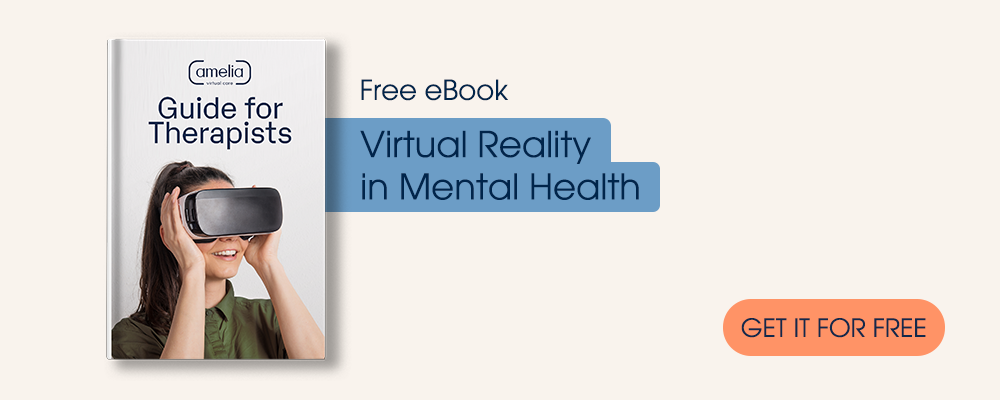Amelia Virtual Care is the most comprehensive and flexible virtual reality (VR) platform. With more than 140 virtual environments designed by clinicians, mental health professionals can use the platform as another handy tool in their day-to-day clinical practice.
Amelia’s VR environments are built on the most widely accepted and effective paradigms of psychology, focusing on scientific papers related to cognitive-behavioral therapy (CBT).
With the Amelia VR library, therapists from around the world have easy access to exposure tools and systematic desensitization techniques to facilitate psychoeducation sessions with patients.
Although CBT is the paradigm that first leveraged advantages conferred by VR and in which VR usage has been most greatly investigated in clinical practice, other psychotherapeutic approaches (ACT, BDT, etc.) can stand to gain from this technology, too. The Amelia Virtual Care solution could facilitate the practice of mindfulness meditation and relaxation techniques.
How can VR benefit the practice of mindfulness techniques?
The American Psychological Association (APA) defines meditation as a “profound and extended contemplation or reflection in order to achieve focused attention or an otherwise altered state of consciousness and to gain insight into oneself and the world.” More specifically, mindfulness is a type of meditation that enables individuals to focus on every moment and simply draw attention to sensory information. This practice is difficult, though, because of the high probability of being distracted by sounds or movement in the surrounding environment.
VR, however, has shown to help address this problem, given that two main features of this technology include a sense of presence and a sense of immersion. While the latter focuses on engaging the user, the former enables the user to perceive that the virtual environment and what it comprises is real (although it is not).
Virtual Reality can be extremely useful for practicing mindfulness techniques–especially among beginners. The effort of imagining a scenario or other elements may prove challenging for some, however, because it eliminates the need to use imagination, VR could contribute to improve patient adherence to therapeutic goals and encourage individual practice between sessions.
Meditation for Emotional Optimization: a set of mindfulness techniques
Amelia Virtual Care’s VR library already includes seven mindfulness and twelve relaxation environments. And now, it will soon play host to Meditation for Emotional Optimization (MEO), a brand-new environment created in collaboration with Sheena Copeland and Benjamin Copeland, two experienced meditation coaches based in California.
The new environment offers a set of various mindfulness techniques like Square Breathing and Body Scanning, alongside Extinction Learning (EL), to help mental health professionals enable the patient to:
- Focus on the present
- Relax in a controlled and immersive environment, and
- Dissolve a specific thought or image mentally, visually and emotionally
With the possibility to adapt and tailor sessions according to individual patient needs, the Meditation for Emotional Optimization environment is an ideal setting to use. Clinicians can choose between different scenarios (a lake, mountain or temple) based on patients’ proficiency and their respective therapeutic phase.
If you wish to discover more about the new mindfulness environment and our collaboration with Sheena and Benjamin Copeland, watch the interview here.
When you subscribe to Amelia, you won’t only enjoy access to the platform, you’ll also receive ongoing specialized trainings (webinar and online courses), customer support, and specific manuals for the correct use of each of the virtual environments. Learn more about this new environment and our comprehensive VR library by setting up a demo session with one of our VR specialists.












